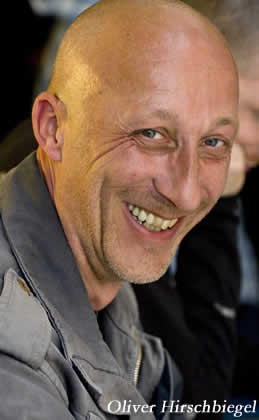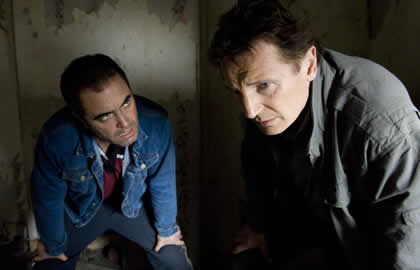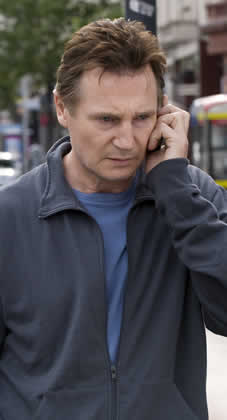Oliver Hirschbiegel, director of Five Minutes to Heaven was born in Hamburg, Germany, in 1957. Hirschbiegel left high school and worked as a cook on a boat. He then studied painting and graphics in the Academy of Arts in Hamburg where he also started  experimenting with video and photography. Hirschbiegel became popular thanks to his TV movies (especially dramas and thrillers) and in 2001 he shot his first movie for cinema: DAS EXPERIMENT, an intense investigation of the aggressive behavior in a simulated prison environment. The film won several awards at festivals around the world.
experimenting with video and photography. Hirschbiegel became popular thanks to his TV movies (especially dramas and thrillers) and in 2001 he shot his first movie for cinema: DAS EXPERIMENT, an intense investigation of the aggressive behavior in a simulated prison environment. The film won several awards at festivals around the world.
His second movie, MEIN LETZTER FILM, released in 2002, is a 90 minute monologue about a woman in her fifties who wants to re-start her life. In 2004 DOWNFALL was released, focusing on the last 12 days of life of Adolf Hitler narrated from the point of view of his young secretary, Traudl Junge. Nominated for an Oscar, the film has won several major awards including a British Independent Film Award for Best Foreign Film.
Bijan Tehrani: How did you come up with this story and how did you encounter the subject of Five Minutes to Heaven?
Oliver Hirschbiegel: It was brought to me; I had worked with another writer on a project about child soldiers in Africa. In the process of doing research for that project we had become close friends so when that film did not happen he slipped this film under my doormat. I was so intrigued by the story and decided that I wanted to do it.
BT: So is this based on a true story?
OH: The historical aspect of the film is based on true events, so the murder is authentic. But what is happening in the present is fiction. The film is a take on what would happen if these two men had actually met in real life.
BT: Have the real-life men seen the final project?
OH: Yes of course, they both have seen the film and they both approve of it. They were both involved in the development of the script. I didn’t want to meet the men personally beforehand, so I would always send someone else with questions that I had prepared. So they were a part of the process from the beginning right to the very end.
BT: How did you go about casting of Five Minutes to Heaven? OH: When I got on board with the project I knew that James Nesbitt was already interested, so I flew over to London to meet with him. I was very familiar with his work so it was really a case of would we be on the same page. We really hit it off and connected well with one another. Then about three weeks later I got a chance to meet with Liam, who liked the script and had also seen Downfall, we also connected very well and I was then able to get him on board.
OH: When I got on board with the project I knew that James Nesbitt was already interested, so I flew over to London to meet with him. I was very familiar with his work so it was really a case of would we be on the same page. We really hit it off and connected well with one another. Then about three weeks later I got a chance to meet with Liam, who liked the script and had also seen Downfall, we also connected very well and I was then able to get him on board.
BT: Your subject applies to many issues that are affecting the world today. Was this your intention from the beginning?
OH: Yes, that was the main reason why I felt that I should do this project. The Northern Irish have set an example for the rest of the world, showing that you can still have a sense of pride and unity in spite of constant violence.
BT: Did you allow the actors to improvise on this film or were they instructed to remain faithful to the script?
OH: I would say about 95% of the dialogue in the film is what was originally on the script. Of course we had sit-downs with the writer and went through all of the dialogue to see if there was anything that could be changed, but when it came to shooting we pretty much stayed loyal to the script. 
BT: How did come up with the visual style of your film?
OH: I decided that I wanted the film to have a very classic look. I was highly inspired by Alfred Hitchcock in the sense that I did not want to use any techniques that were unnecessary or overly flashy. There is nothing wrong with staying with one shot and allowing the audience to just enjoy the film instead of seeing constant cuts.
BT: How has reaction been to Five Minutes to Heaven so far?
OH: It’s been amazing how much people have appreciated the film. The film is very thought provoking and it allows people to really contemplate the meaning of violence and all of the horrible affects that is has on people; not just the victims but also the people who commit the crimes.
BT: How did you work with the actors on the set?
OH: Even great actors like Liam and James need direction. I would talk to the actors about their characters and just make sure that everyone is on the same page and that we have the same interpretation of the character, then I just allow them to go.
BT: Do you have any future project lined up?
OH: We are trying to revive the child soldier project in Africa, we are still not sure if we are going to get the film financed. We are also trying to develop a Mafia inspired story that will take place in Italy.
BT: Thank you and I wish you luck with this film and all of your future projects!

